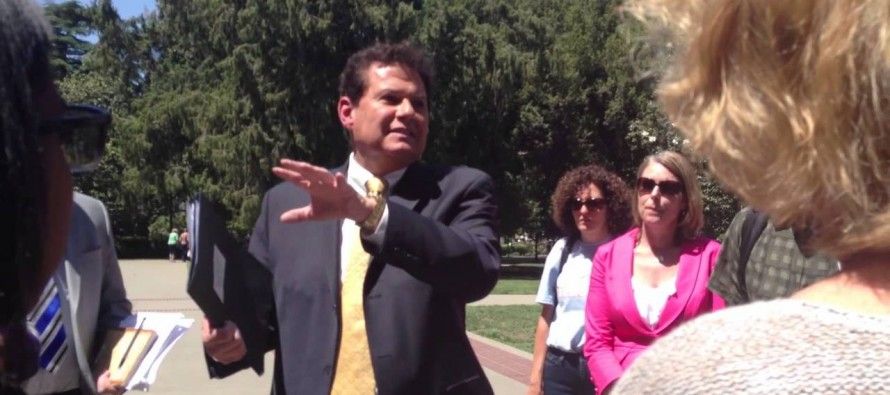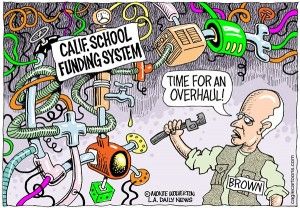Unions kill teacher evaluation bill

May 3, 2013
By Katy Grimes
For most parents in California, education is a nonpartisan issue. But too many of the state’s elected politicians, who claim to represent all constituents, accept teachers union campaign contributions — and lots of them.
This makes education very political.
Because of politics, a very good education reform bill was killed by Senate Democrats Wednesday.
SB 441 by Sen. Ron Calderon, D-Montebello, would have required school districts to regularly evaluate the performance of teachers and school principals.
School districts are currently required only to evaluate teachers as “satisfactory” or “unsatisfactory.” And these performance evaluations are not exactly pop quizzes; they are scheduled in advance so teachers will not be caught off guard.
Calderon’s bill would create four different evaluation grades, and would increase the frequency of evaluations for veteran teachers from every five years to every three years.
Students are evaluated four times each school year.
“I didn’t realize you were a person interested in education,” Education Committee Chairwoman Sen. Carol Liu, D-La Cañada Flintridge, said to Calderon before he began testimony. “Oh, and I see you’ve brought your friends,” she added when hundreds of parents, students, reform advocates and public school teachers in the audience stood up to testify in support of SB 441.
“If the hundreds of people here today had given $2,000 each [in campaign contributions to Legislators], we might have matched the teachers union contributions to fight this bill,” one reform advocate told the committee.
Opponents of the bill, teachers and school employee labor unions, included the the California Teachers Association, the California Federation of Teachers and the California Labor Federation. Also opposing was California Superintendent of Public Instruction Tom Torlakson. Despite Calderon’s amendment, the unions said the bill was unacceptable for threatening “to silence the voices of teachers in this important method of improving teaching.” The unions also said SB 441 “undermines the usefulness of an evaluation system by focusing on just four unproven measures of performance that the bill’s backers ‘assume’ will boost teacher effectiveness.”
“Teachers devote their entire lives to make every child succeed,” said Seth Bramble, legislative advocate for the CTA. Bramble said parents already have a part in the collective bargaining agreement at the beginning of the local collective bargaining process.
“How often teachers get evaluated is by mutual agreement,” Bramble said, to shouts of “no” from the audience.
Lynn Fox with the CFT said, “Teachers’ voices are neglected.”
Reform bill killed
Last week, the Senate Education Committee heard from dozens of parents, teachers and students who support teacher evaluations, but the measure stalled on a 4-4 vote.
Calderon asked the committee for reconsideration and SB 441 was heard again Wednesday.
The sticking point last week was only about collective bargaining — teachers union members claimed that the bill allowed parents to have input in the collective bargaining process. Calderon amended SB 441 to clarify that the parent involvement piece does not impact teachers’ collective bargaining.
The CTA’s response to Calderon’s bill was par for the course. The teachers union referred to its 2012 document of union-preferred teacher evaluation procedures.
“It’s difficult to believe that the union is serious about augmenting such a convoluted strategy, but since it needs to feign concern, it throws out an unrealistic alternative, knowing that it will never see the light of day,” Union Watch website wrote. “CTA’s main concern seems to be that teachers’ collective bargaining rights are going to be diminished. But there is nothing in this tame bill that would affect collective bargaining except for the increase in the frequency of teacher evaluations.”
“I’m evaluated four times a year. Teachers are not even evaluated four times in a decade,” one student testified.
The final vote Wednesday, after a contentious and long hearing, was 3-0, leaving SB 441 very dead. The three votes cast in favor of SB 441 were by Sen. Mark Wyland, R-Escondido, Sen. Minority Leader Bob Huff, R-Diamond Bar, and Sen. Lou Correa, D-Santa Ana.
“Time and time again, senators on both sides of the aisle pledge their support for fixing our broken education system,” Jessica Ng with the reform group Students First said. “But when given the opportunity to vote for even modest reforms, like those in Senate Bill 441, only three members of the Senate Education Committee had the courage to do what’s right for California’s kids.
“In failing to vote on SB 441, six California legislators ignored the will of their constituents and instead put adult interests ahead of student interests. Yet again, the outsized influence of Sacramento’s special-interest groups have blocked reforms that would help improve our schools — and California’s students are the ones who will suffer as a result.”
And that outsized influence was never more obvious than when Sen. Liu and Sen. Hannah-Beth Jackson, D-Santa Barbara, tried to explain to Calderon why his bill was going to fail. “I just think there are some people missing from the table here,” Jackson said. “I want to see people who are here with people who are not here. Without it, this bill is just too flawed.”
The audience roared with disapproval. Parents, teachers, students and education reform advocates loudly asked who was missing from the table.
Lawmaker confronted on the issues
One of the six senators who failed to vote on SB 441 got an earful from parents, students, reform advocates and teachers on his way out of the Capitol Wednesday. Sen. Marty Block, D-San Diego, was confronted by a group after the hearing just outside of the Capitol.
Several members of the group told Block they had traveled all the way from his district in San Diego to the Capitol, for the second week in a row, to try to impress upon lawmakers just how important SB 441’s modest request was to education.
Sarah Hernholm, the founder of Whatever it Takes, an organization focused on empowering youth to take on leadership roles in their community, told Block that the committee chairwoman, Sen. Carol Liu, had cut off one of the students Hernholm brought to the hearing, preventing the student from giving a statement in support. Hernholm had the high school junior share her statement with Block. The student told Block that, because she was too young to vote, he was her voice at the Capitol. But he wasn’t at the hearing, and did not vote. She wanted to know why.
Block said he is pushing his own bill, and didn’t want to hurt his chances of getting it passed by voting on Calderon’s bill (see video above). Block added that he didn’t want to jeopardize the supporters of his bill by involving himself in Calderon’s bill, so he abstained on both votes.
Block said his bill, SB 657, is a two-year bill. This incensed the spontaneous crowd. “We’ve watched over 30 years for reforms,” one teacher said. “Why is it we’re ranked 47th?” Meaning California schools commonly are ranked near the bottom of the 50 states on national tests.
The StudentsFirst State Policy Report Card gave California an “F” grade for teaching, an “F” grade for parental inclusion, and a “D” grade for spending and wise governing.
But this didn’t matter to Liu, Jackson or the other committee members who did not vote on the bill. Not voting was an blatant abdication of their responsibility as elected lawmakers.
One education advocate summed up the problem the best: “If we don’t fix the broken teacher evaluation system, the courts will.”
Related Articles
Don’t trust Covered California’s latest round of happy talk
While the national media increasingly seem to have figured out that Obamacare is a farce, its California version continues to
McClintock: The adult in the room
Sept. 25, 2012 By Katy Grimes I’ve written much recently about the end of the two-year legislative session in the
Unreal: CA transit workers permanently protected from pension reductions
Californians are used to suffering the consequences from state laws drafted by unions and forced through by their allies/puppets in





